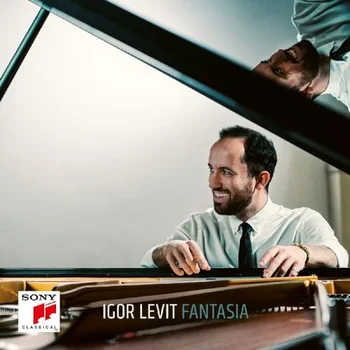In this new 2 CDs release, Igor Levit offers a contemplative exploration of the improvisatory aspects inherent in the fantasia. This journey encompasses both renowned pieces such as Liszt’s B minor sonata and lesser-known piano works like Busoni‘s “Nuit de Noël.” Levit weaves together a musical puzzle, drawing subtle parallels between these compositions.

One of these specific threads connects the Liszt Sonata to the Berg Sonata Op. 1. The obvious connection is by key and one-movement form but as far as character is concerned, this is where each composer’s take on “improvisation” starts to diverge. The Liszt Sonata (CD 1, tracks 4-7) needs little introduction with notable versions by Horowitz (1932), Richer live (1965), and Arrau and Argerich (both 1971). Precedence aside, it’s worth noting that the element of the fantasia resides in the work’s sprawling length and plethora of themes and motifs. I listened in anticipation for a suspenseful opening in Levit’s performance but didn’t find it quite heady enough: the ominous descending line moves a bit too slowly and the octaves, which should cut through the air like a guillotine, don’t have enough snap. I was momentarily worried that this would set the stage for the rest of the sonata, but the pianist does stellar work going forward. Yes, he takes a markedly dry stance on articulation, but the urgency and madness of the Allegro Energetic is not lost. The grand D major theme (3’21”) is most satisfying: resonant and surging, the theme greets the ear with expansive waves of sound.
What I’ve always appreciated about Levit’s playing is how he tries to approach the music from a lesser explored angle. Such is the case with the Andante Sostenuto, in which he purposefully takes the time for the sounds to fully dissipate; this mindful release of notes subconsciously encouraged me to fully appreciate each sonority individually from start to finish, rather than its merely place in a phrase. Thus, this “slow movement” becomes not just a portrayal of the more lyrical side of the sonata, but truly lets the mind wander and explore.
The fugue sees the return of Levit’s pointed articulation, which does sound skittish at times but is nonetheless exciting. Particularly impressive is his transition back into the opening thematic material (5’25” onwards) with unparalleled clarity in the fast passages that drive a whirring energy. This in turn metamorphoses into convincing octaves that blast out a hefty dose of menace.
Berg’s Sonata Op. 1 (CD 2, track 2) derives its fantasia through its harmonic language and musical character, which Levit integrates seamlessly. This is admittedly not music that is comforting, and he makes this abundantly clear. The troubling dissonances are tinged with yearning and sadness at some points, introspection at others. At the heart of it all, though, is a lurking danger. The music’s emotional instability is what he conveys most honestly: we wait anxiously for those moments that could spiral out of control — and there are a small handful. These are where Levit goes all out, but what ensues is not necessarily chaos but passionate intensity. And while we seek solace in a return to the tonic key, the pianist cleverly hits us with irony. When B minor finally makes its brief appearance at the end, his whispery dynamics make us realize that the return is but an afterthought. The catharsis we seek is only a figment of the imagination.
Levit calls Busoni’s Fantasia Contrappuntistica (CD 2, track 3) the album’s centerpiece whose edizione definitiva he plays here. At 34 minutes, it is indeed a monumental work and its unique improvisatory soul comes from its myriad of tonalities, modalities, and styles throughout. In the beginning, for instance, Levit adds lovely shimmer to the Impressionistic chords. Then, there’s a Bachian fugue played with clarity and intelligence. Towards the end, we’re pulled to the other end of the spectrum in a world of charged dissonance. Busoni throws everything of every style at the performer, and Levit is prepared at every turn: adapting easily to the quick and stark changes, he makes the most of even the shortest transition material. What we get is a highly eclectic yet somehow cohesive journey through a world of complexity.
The other works on the album are equally well conceived and speak on a larger scale to Levit’s sheer versatility. As with his other programs, Fantasia is a testament to the time and thought he puts into exploring and connecting each work. The result is a most enlightening listening experience that calls for repeated revisitation.
Recommended Comparisons
Horowitz | Argerich | Pollini | Gould
Fantasia
Igor Levit, Piano
Sony, CD 19658811642



















